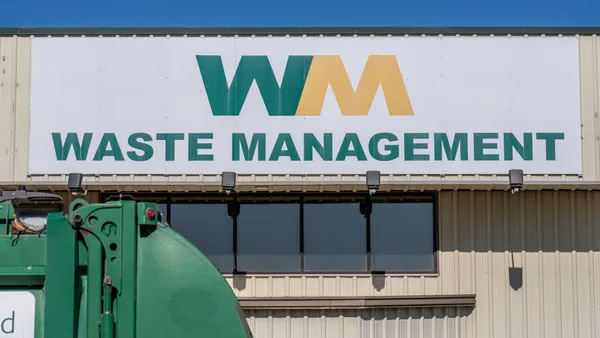Dive Brief:
- The New York City Council's sanitation committee approved a bill to establish commercial waste zones (Intro. 1574-A) by a vote of 6-2 on Tuesday afternoon. Chairman Antonio Reynoso, the bill's primary sponsor, described critiques that the Council was rushing the process as "disingenuous" and the vote as "a step towards justice."
- Ahead of the vote, Council Member Chaim Deutsch (a sanitation committee member) organized a letter to Reynoso and Department of Sanitation (DSNY) Commissioner Kathryn Garcia requesting more time for discussion of a "monumental issue with implications for decades to come." Deutsch's office confirmed the final letter was endorsed by 13 members.
- The sanitation committee also advanced other bills related to commercial waste. Intro. 1082 will require GPS devices in vehicles servicing commercial waste zones. Two other bills (Intro. 1083 and Intro. 1573) will expand the Business Integrity Commission's authority over labor and environmental issues.
Dive Insight:
Today's vote marks the penultimate step to passing legislation that will dramatically reshape the nation's largest commercial waste market after years of debate. As outlined in the bill, DSNY will oversee a process to contract with up to three companies per zone across 20 zones. No company will be allowed to hold contracts in more than 15 zones. An additional five citywide contracts will be awarded for container service at larger buildings.
In order to win these zones, companies will be expected to meet a variety of labor and environmental standards that supporters say aren't being adequately addressed in the current system. Additional consideration will be given to companies that can make commitments for advanced fleet technology and new processing infrastructure, among other areas.
The Transform Don't Trash coalition – a longstanding group of labor and environmental supporters – congratulated Reynoso on the bill's passage, describing it as "the reform that private sanitation workers and environmental justice communities have been demanding for years."
New Yorkers for Responsible Waste Management (NYRWM), the lead opposition group, released its own final statement on the proposal ahead of Tuesday's vote. The four-page letter to council members states that "no consensus among all stakeholders has emerged" and calls for a delay. The group raises questions about whether each zone will actually have three carters as opposed to one, a perceived lack of public discussion about the final bill, negative effects on local businesses, the extent of DSNY's future authority over the industry and much more.
During the committee hearing, Reynoso mentioned recent unspecified efforts to spread "misinformation" about the bill's effects by people that "have chosen to completely disregard three years of intense work to get to this point" and made no move for further debate.
Supporters remain confident that their commercial waste zone bill will pass due to the number of sponsors and backing from Mayor Bill de Blasio's administration, among other notable forces. The final vote is scheduled for Oct. 30.
If it does pass, many local participants expect a wave of consolidation could begin before the RFP process is even fully underway. City estimates have put the total number of companies in the market as high as 90, which adds to calls for more regulation, but NYRWM's analysis of customer registries and other data sources estimates the list of companies with notable business is actually closer to 35.
The number of companies left in New York is likely to shrink in the years ahead either way, but the extent of that change will depend in part on how many viable players are left. Certain operators who decide they can't be competitive in a zone system, and haven't made investments to meet existing 2020 fleet requirements, could choose to exit.
Larger players such as Action Environmental, Waste Connections, and potentially Waste Management, stand to maintain or expand market share. DSNY and Reynoso assert there will be room for companies of all sizes, but have also recognized the competitive landscape is likely to change.










